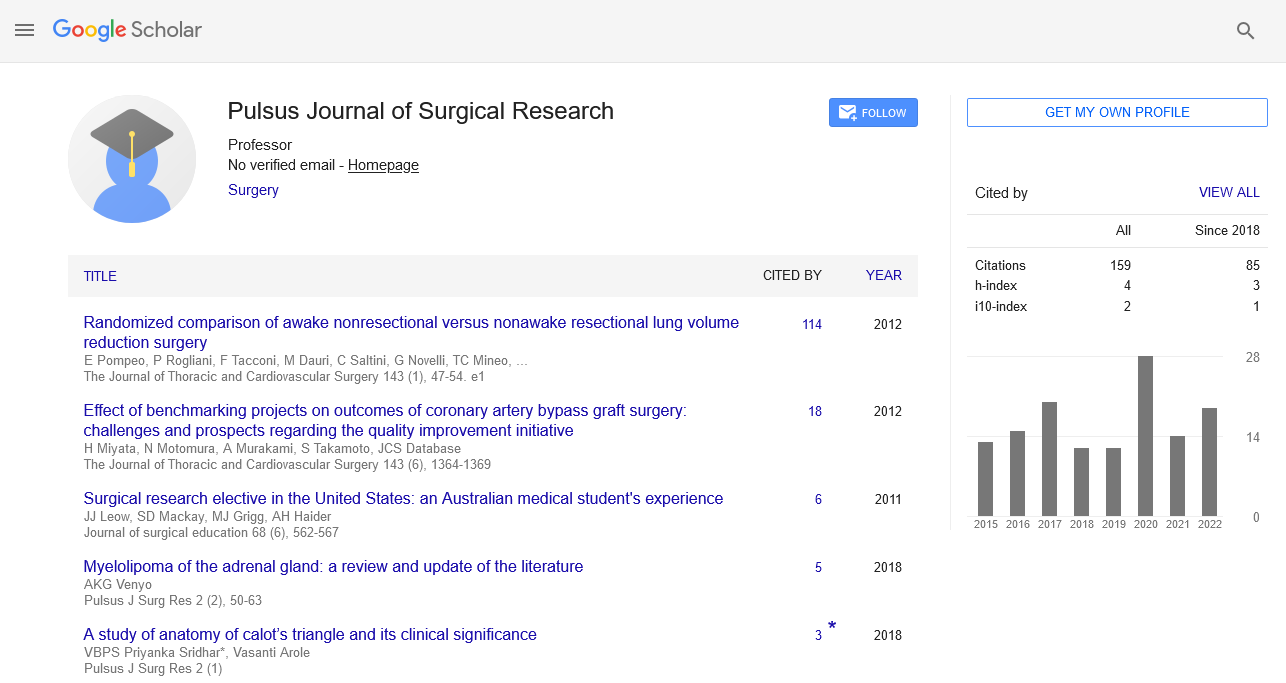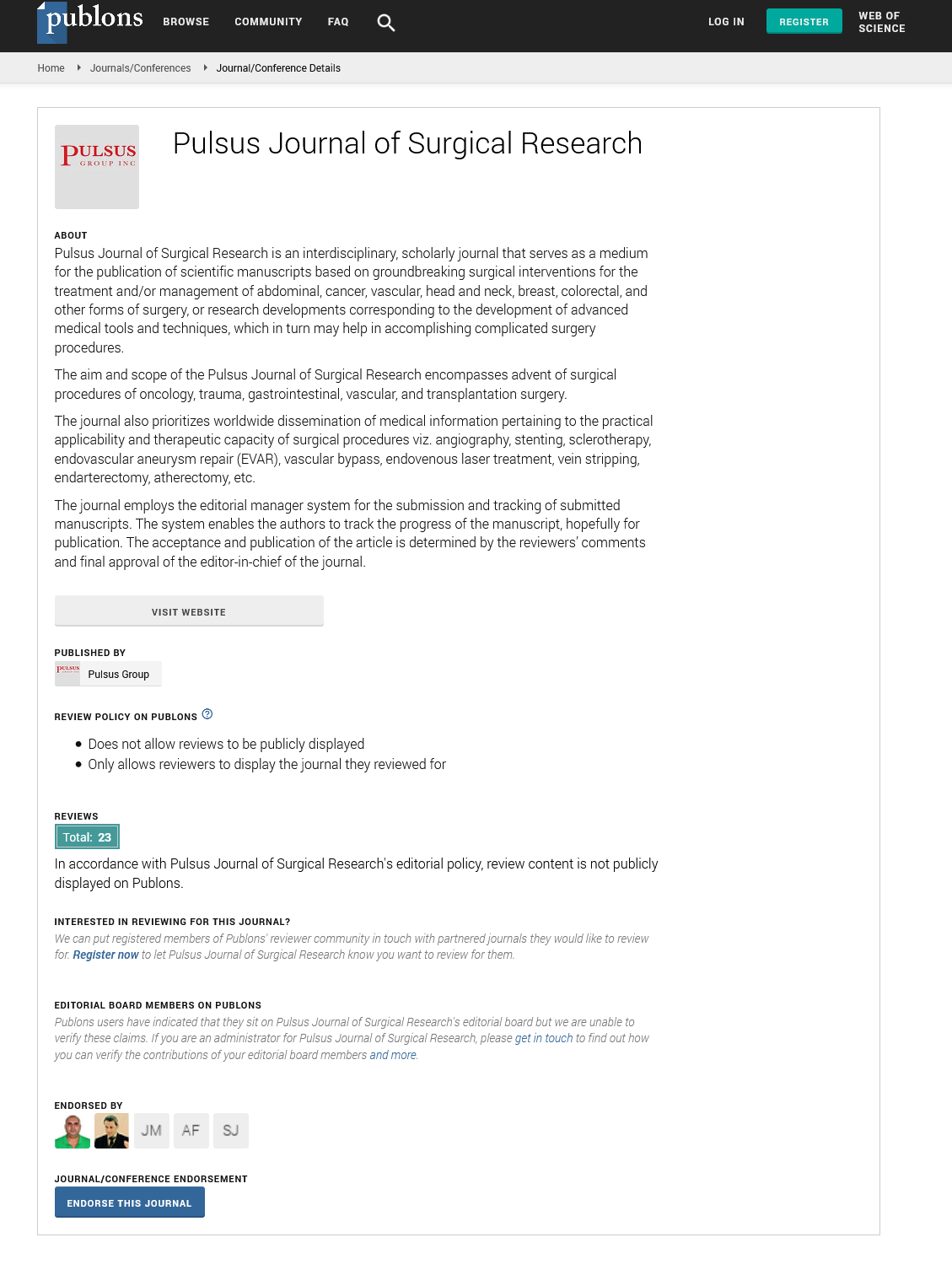Trial-level variables influencing enrollment and completion in cancer clinical trials
Received: 03-Jun-2022, Manuscript No. pulpjsr- 22-5675; Editor assigned: 06-Jun-2022, Pre QC No. pulpjsr- 22-5675 (PQ); Accepted Date: Jun 26, 2022; Reviewed: 18-Jun-2022 QC No. pulpjsr- 22-5675 (Q); Revised: 24-Jun-2022, Manuscript No. pulpjsr- 22-5675 (R); Published: 30-Jun-2022
Citation: Bharti S . Trial-level variables influencing enrollment and completion in cancer clinical trials.J surg Res. 2022; 6(3):40-42.
This open-access article is distributed under the terms of the Creative Commons Attribution Non-Commercial License (CC BY-NC) (http://creativecommons.org/licenses/by-nc/4.0/), which permits reuse, distribution and reproduction of the article, provided that the original work is properly cited and the reuse is restricted to noncommercial purposes. For commercial reuse, contact reprints@pulsus.com
Abstract
In the United States, cancer ranks as the second most common cause of death. Clinical trials convert discoveries made in basic science into cancer treatments that patients require. One of the major obstacles to the conclusion of oncology clinical trials is the inadequate accrual of study participants. This study sought to fill knowledge gaps and provide areas for future research by looking into trial-level variables that influence the enrollment and/or completion of oncology clinical trials.
Key Words
Hepatobiliary; Surgical care; Oncology, Brest cancer; Vascular surgery
Introduction
With an anticipated death toll of 606,520, cancer is the secondWleading cause of death in the US. The rising number of oncology clinical trials and the astronomical expenses associated with conducting these studies have created obstacles to their completion as pressure has intensified to swiftly transfer fundamental scientific discoveries into therapies that are urgently required by cancer patients. Oncology clinical trials began in around 2800, according to ClinicalTrials.gov, in 2015. In 2019, it increased to more than 4600. Lackluster trial participant recruitment has emerged as one of the biggest obstacles to the completion of clinical trials due to the rise in the number of oncology clinical trials and the limited resources available to support the conduct of these trials. Only 3-8% of adults with cancer take part in clinical trials. A 20% failure rate for oncology clinical trials is also common due to insufficient accrual. As obtaining the specified sample size is necessary for valid results, patient accrual is a critical statistic in assessing the success of a clinical study. Too often, incomplete accrual results in the early termination of clinical trials or their extension. This hurts the financial and other resources of the sponsors and participating sites for cancer trials. The ultimate objective of offering innovative, effective cancer medicines to people who urgently require them is hampered most significantly by trials that are postponed or canceled early. A significant improvement in the effectiveness, completion, and prioritization of clinical trials was demanded by the Institute of Medicine in 2010. In the current period of constrained research funding for governmental, academic, and business groups, accurate projections about the accrual and completion of a study are essential to achieving these objectives. The only way to make these exact forecasts and achieve the Institute of Medicine's goals is to thoroughly understand the variables influencing the enrollment and completion of oncology clinical trials. The body of research shows that factors influencing enrollment and completion in oncology clinical trials take place at the individual, interpersonal, organizational, community, and policy levels. Even though numerous researchers have looked at these characteristics and created interventions like patient navigation and communication training to address barriers, enrollment in and completion of clinical trials still fall short. It is not obvious from research if aspects including eligibility requirements, anticipated sample sizes, study phases, study designs, and the use of randomization that may have an impact on successful accrual and trial completion have been sufficiently examined. To fill in any gaps in the literature and suggest relevant areas for future research, this review looked at the empirical literature to investigate trial-level characteristics that affect trial enrollment and/or completion in oncology clinical trials. The following research query served as the review's compass: Which trial-level variables affected the enrollment and/or completion of oncology trials was one of the topics covered in research that examined big data sets of clinical trials. Sponsor, number accrual was linked to multimodality clinical trials. Oncology clinical trials' accrual and/or completion are impacted by the following factors: eligibility requirements, randomization, sample size, trial phase, use of placebos, and mandatory protocol procedures and their timing. Phase I cancer clinical trials' sluggish accrual design/protocol requirements. and was mostly attributed to safety/toxicity, difficulties, Additionally, and eligibility eligibility requirements design/protocol concerns such as needed procedures, treatment schedules, and overall trial complexity were the main causes of the poor accrual for phase II cancer clinical trials. Low accrual was linked to increased trial complexity, which was defined by a higher number of targeted disorders in inclusion criteria, therapies, and study locations. Despite conflicting findings in research, sample size and clinical trial phase were two trial design elements that affected enrollment and/or completion of oncology clinical trials. The bigger sample size was a predictor of low accrual, it was discovered. However, showed that for completed trials with a median sample objective, the sample size target (not stated) was larger than for terminated trials with a median. Additionally, they discovered that phase II and phase III studies had much lower early termination rates compared to phase I trials, with poor accrual accounting for the majority of J Surg Res Vol 6 No 3 June 2022 early terminations across all trials. However, limited accretion was predicted by the proven phase III. In other research, accrual by trial phase was not seen to vary. Another aspect of the trial design that influences accrual in oncology clinical trials is eligibility. In general, low accrual was linked to eligibility requirements that stress patients, like those that demand the collection of samples unrelated to regular medical care. The total number of eligibility requirements was strongly correlated with the length of the recruitment period in studies that enrolled patients in study of phase I through III molecular trials. Trial development duration, eligibility requirements, randomization, sample size, trial phase, use of placebos, and necessary protocol procedures and their timing were all elements that were looked into. The factor that was looked into the most frequently was eligibility requirements. Although they are required to keep out individuals with poor prognoses and a high risk of adverse events, eligibility requirements can negatively affect enrollment and/or trial completion. It is necessary to assess each eligibility requirement to make sure it is supported by the scientific literature and isn't included just because it was in earlier protocols. Further suggests lowering eligibility standards once a We now know more about the toxicity profile of the medicine.






